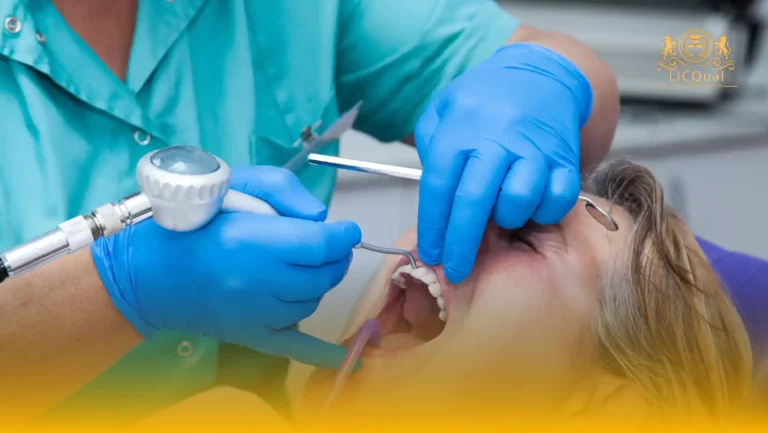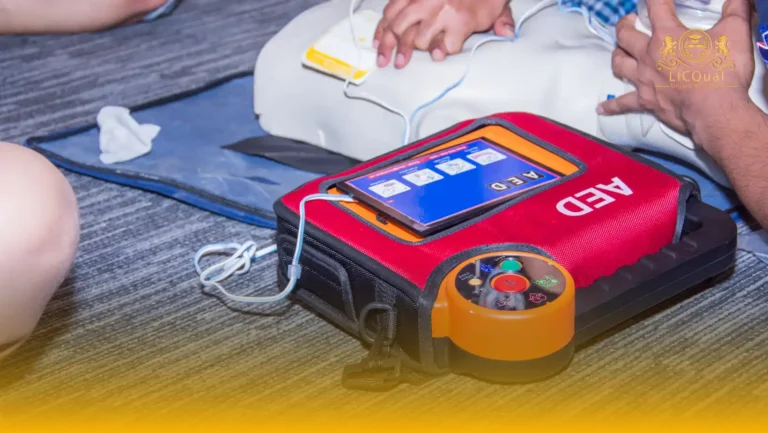The LICQual Level 3 Certificate in Endocrinology (Cert E) is a specialised qualification designed for healthcare professionals seeking to advance their knowledge and expertise in the field of endocrinology. This Level 3 Certificate is aimed at learners with prior healthcare experience who wish to enhance their career prospects, deepen their professional understanding, and fulfil Continuing Professional Development (CPD) requirements. It is not intended for beginners but for those committed to improving patient care in endocrine health.
Learners enrolling in this course will gain a thorough understanding of endocrine system anatomy and physiology, hormonal regulation, common and complex endocrine disorders, and evidence-based management strategies. The course emphasises both theoretical knowledge and practical application, enabling learners to apply best practices in clinical, hospital, and community healthcare settings.
To maintain the highest standards of training and learner achievement, centres delivering this qualification must employ competent and qualified staff, and provide access to all necessary learning materials, clinical resources, and practical facilities. This ensures learners receive a supportive, engaging, and high-quality educational experience that promotes professional growth and clinical excellence.
Whether you are a nurse, doctor, allied health professional, or clinical researcher, this Level 3 Certificate provides a solid foundation for professional development, improved clinical competence, and enhanced patient outcomes. By completing the course, learners will be equipped to make informed clinical decisions, stay up to date with emerging trends in endocrinology, and uphold best practices in patient-centred care.
Course Overview
Qualification Title
LICQual Level 3 Certificate in Endocrinology (Cert E)
Total Units
6
Total Credits
24
GLH
120
Qualification #
LICQ2200857
Qualification Specification
To enroll in the LICQual Level 3 Certificate in Endocrinology (Cert E), applicants must meet the following criteria:
|
Qualification# |
Unit Title |
Credits |
GLH |
|---|---|---|---|
|
LICQ2200857-1 |
Anatomy and Physiology of the Endocrine System |
4 |
20 |
|
LICQ2200857-2 |
Common Endocrine Disorders |
4 |
20 |
|
LICQ2200857-3 |
Advanced Endocrine Disorders |
4 |
20 |
|
LICQ2200857-4 |
Diagnostic Techniques and Laboratory Investigations |
4 |
20 |
|
LICQ2200857-5 |
Treatment and Therapeutic Interventions |
4 |
20 |
|
LICQ2200857-6 |
Patient Care, Ethics, and Multidisciplinary Management |
4 |
20 |
By the end of this course, learners will be able to:
Unit 1: Anatomy and Physiology of the Endocrine System
Learning Outcomes:
- Understand the structure and function of endocrine glands and organs
- Explain the mechanisms of hormone synthesis, secretion, and regulation
- Describe the role of the endocrine system in maintaining homeostasis
- Analyse how endocrine function impacts overall health and physiological processes
Unit 2: Common Endocrine Disorders
Learning Outcomes:
- Identify common endocrine disorders such as diabetes, thyroid dysfunction, and adrenal gland disorders
- Understand the pathophysiology and risk factors associated with these conditions
- Apply evidence-based strategies for diagnosis and management
- Evaluate the impact of these conditions on patients’ health and quality of life
Unit 3: Advanced Endocrine Disorders
Learning Outcomes:
- Understand complex endocrine disorders, including pituitary, hypothalamic, and metabolic syndromes
- Analyse disease progression, complications, and treatment challenges
- Apply evidence-based approaches for advanced clinical management
- Evaluate case studies to inform professional decision-making in endocrine care
Unit 4: Diagnostic Techniques and Laboratory Investigations
Learning Outcomes:
- Understand key diagnostic tools and laboratory investigations in endocrinology
- Interpret hormone assays, imaging results, and clinical tests accurately
- Apply diagnostic information to support clinical decision-making
- Evaluate the effectiveness of diagnostic approaches in improving patient outcomes
Unit 5: Treatment and Therapeutic Interventions
Learning Outcomes:
- Understand pharmacological and non-pharmacological treatment options for endocrine disorders
- Apply hormone replacement therapies and lifestyle modification strategies effectively
- Develop individualised care plans tailored to patient needs
- Assess the outcomes of interventions to enhance patient care and management
Unit 6: Patient Care, Ethics, and Multidisciplinary Management
Learning Outcomes:
- Demonstrate patient-centred care and effective communication with patients and families
- Apply ethical principles in the management of endocrine conditions
- Collaborate effectively within multidisciplinary healthcare teams
- Evaluate strategies for optimising patient outcomes through coordinated endocrine care
The LICQual Level 3 Certificate in Endocrinology (Cert E) is designed for healthcare professionals who want to expand their expertise in hormonal regulation, endocrine system disorders, and evidence‑based patient care. This Endocrinology Level 3 course is ideal for doctors, nurses, allied health professionals, and educators who are seeking CPD accreditation, career advancement, and an internationally recognized qualification. It is not intended for beginners but for those already working in healthcare who want to enhance their specialist knowledge and clinical skills in endocrinology.
1. Medical Doctors and Physicians
- Strengthen diagnostic and treatment skills for endocrine disorders
- Gain advanced knowledge of diabetes, thyroid, adrenal, and pituitary diseases
- Improve patient outcomes with evidence‑based endocrinology practices
- Enhance clinical decision‑making in hormonal and metabolic conditions
- Earn a globally recognized endocrinology certification for career growth
2. Nurses and Allied Health Professionals
- Build confidence in supporting patients with endocrine conditions
- Learn patient‑centered approaches to diabetes and thyroid care
- Expand scope of practice with specialized endocrinology training
- Fulfill continuing professional development (CPD) requirements
- Increase employability in hospitals, clinics, and community health centers
3. Endocrinology Specialists and Clinicians
- Deepen expertise in managing complex hormonal disorders
- Stay updated with modern diagnostic and therapeutic approaches
- Strengthen technical and clinical decision‑making skills
- Gain recognition with a Level 3 Endocrinology qualification
- Broaden career opportunities in specialist healthcare services
4. Laboratory and Diagnostic Professionals
- Enhance skills in endocrine testing and diagnostic procedures
- Learn advanced techniques for hormone analysis and interpretation
- Improve accuracy in laboratory reporting and patient support
- Gain CPD credits while advancing technical expertise
- Strengthen career profile in diagnostic and research laboratories
5. Healthcare Educators and Trainers
- Integrate endocrinology knowledge into teaching and training programs
- Enhance credibility with an international certification
- Support students with up‑to‑date clinical and scientific insights
- Strengthen academic and professional profiles
- Contribute to evidence‑based education in endocrinology
6. Public Health and Community Health Professionals
- Address the rising prevalence of diabetes and endocrine disorders
- Learn preventive strategies for hormonal health and awareness
- Support community health programs in endocrine care and education
- Gain skills to manage common endocrine conditions at primary care level
- Strengthen role in public health and patient advocacy initiatives
7. International Healthcare Professionals
- Obtain a globally recognized endocrinology certificate
- Align with UK and international healthcare standards
- Improve career mobility across countries and regions
- Gain competitive advantage in global healthcare markets
- Access structured, flexible learning designed for busy professionals
To deliver high-quality training and ensure learner success, centres offering this qualification must meet the following requirements:
- Qualified and Competent Staff: Centres must employ experienced trainers and assessors with relevant professional qualifications in endocrinology, healthcare, or related clinical fields. Staff should have practical experience and expertise in Level 3 healthcare education.
- Access to Learning Resources: Centres must provide learners with up-to-date course materials, textbooks, digital learning platforms, and reference resources to support both theoretical knowledge and practical application.
- Teaching and Learning Facilities: Centres should have suitable classrooms, clinical simulation areas, and demonstration facilities to facilitate interactive and practical learning experiences.
- Assessment Arrangements: Centres must implement robust assessment procedures, including formative and summative assessments, to ensure learners achieve all required learning outcomes.
- Health and Safety Compliance: Centres must maintain safe learning environments, adhering to UK health and safety regulations, particularly for practical or clinical sessions.
- Quality Assurance Systems: Centres should have effective internal quality assurance mechanisms, including monitoring teaching standards, learner feedback, and continuous improvement strategies.
- Support for Learners: Centres must provide guidance and support services, including access to tutors, mentoring, and resources for independent study to promote learner success.
Meeting these requirements ensures that centres deliver a professional, credible, and internationally recognised training programme, equipping learners with the knowledge and skills needed for excellence in endocrinology.
Assessment and Verification
All units within this qualification are subject to internal assessment by the approved centre and external verification by LICQual. The qualification follows a criterion-referenced assessment approach, ensuring that learners meet all specified learning outcomes.
To achieve a ‘Pass’ in any unit, learners must provide valid, sufficient, and authentic evidence demonstrating their attainment of all learning outcomes and compliance with the prescribed assessment criteria. The Assessor is responsible for evaluating the evidence and determining whether the learner has successfully met the required standards.
Assessors must maintain a clear and comprehensive audit trail, documenting the basis for their assessment decisions to ensure transparency, consistency, and compliance with quality assurance requirements.







